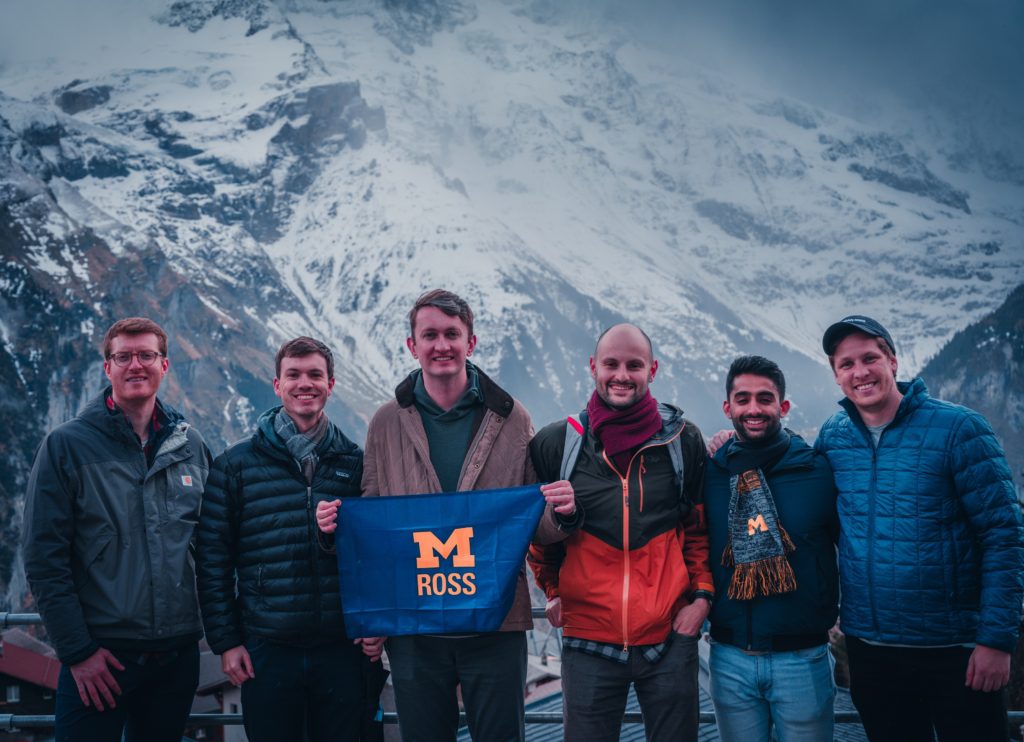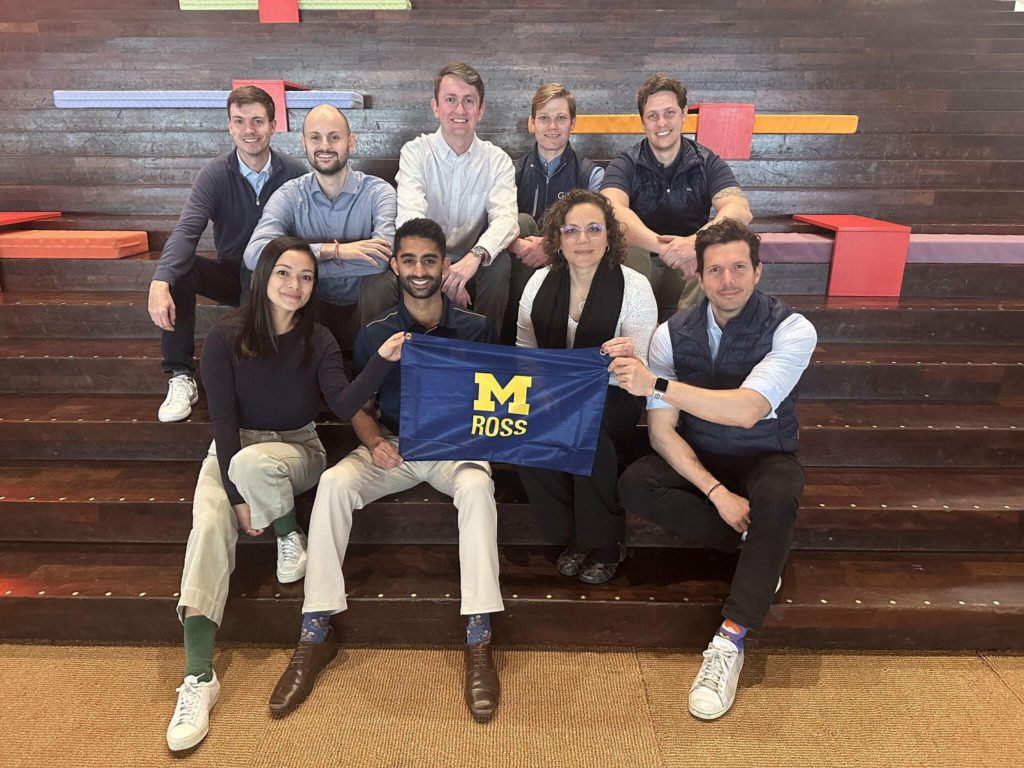
A Multidisciplinary Action Project team of Michigan Ross MBAs took a break from their fact-finding trip through Switzerland to snap a photo of the Ross flag in front of the Alps. The team worked with a Swiss agency trying to find sustainable energy solutions for developing countries for its MAP project. ‘You can’t have a project focused on sustainability and climate change without taking time to appreciate the beauty of the world that we are dedicating it to,’ says team member Tony Nikolov, MBA ‘24.
When it comes to learning new finance models, the basics of tried-and-true frameworks, or the complexities of business theories, the MBA classroom is great at laying the foundations. But when it comes time to put all those lessons all to practice, there’s no greater classroom than the real world.
University of Michigan’s Ross School of Business has been a leader in experiential learning for decades, creating unique in-the-field projects and courses for students to tackle real-life business challenges. It’s also a leader in action-based sustainability, offering students the space and support to complete projects focused on sustainability challenges both big and small, at home and around the world.
“Action-Based Learning is such a powerful platform for collaboration and practical application. It’s an opportunity to put to the test all the professional goals you set out for yourself in the first year of an MBA program,” says Tony Nikolov, part of a team of MBAs who worked with a sustainable energy agency in Switzerland as part of Ross’ Multidisciplinary Action Project (MAP) course.
“And best of all, the experience can manifest in so many ways. Some students may use MAP as an environment to showcase their leadership presence and team management while others use it to hone and practice hard skills they learned from their classes and academic experiences.”
From MAP to the Impact Design Lab to the Erb Institutes Impact Projects, Michigan Ross offers students a myriad of opportunities to apply their classroom tools to sustainability issues in the real world.
MULTIDISCIPLINARY ACTION PROJECTS
Where most of the top-ranked business schools have been hopping on the experiential bandwagon over the last several years, Ross’ MAP (Multidisciplinary Action Project) course is more than three-decades old.
“That is at the core our defining characteristic,” Brad Killaly, associate dean of MBA programs, told P&Q two years ago when we named Ross our MBA Program of the Year. “It is who we are. I know other schools have tried to focus on action-based learning but we are the pioneers and the innovators.”
All first-year full-time MBAs must complete MAP, a seven-week course in which students work full-time on a real business challenge for a sponsor company or organization. Almost half of the projects are located outside of the United States, and they range from everything from creating a market entrance strategy to working with a technology startup.
In the last academic year, 19 MAP projects focused on climate change.
That includes Nikolov’s MAP team which worked with the Basel Agency for Sustainable Energy (BASE) in Basel, Switzerland. BASE works to develop sustainable energy solutions, particularly in developing countries.
The MBAs focused primarily on servitization, creating models for Heating and Cooling as a Service (HaaS & CaaS). Their MAP aimed to identify additional funding opportunities – particularly in carbon credits and offset certificates – to hasten the global adoption of servitization models. To create their final report, the MBAs interviewed experts in carbon financing, explored industry ethics, analyzed carbon verification platforms, and reviewed emerging studies in carbon financing.

Nikolov MAP Team pictured with the BASE team during their visit to Basel, Switzerland. Top row from left: Jason Rhodin, Tony Nikolov, Alexander Dawson, Daniel Cotton, and Bruno Regattieri. Bottom row: Emma Wink (BASE), Nikhil Khurana, Livia Miethke (BASE), and Dimitris Karamitsos (BASE).
In the end, they presented a comprehensive carbon-credit feasibility analysis of existing BASE projects to agency bigwigs, including the managing director and other technical leaders. Volatile carbon credit prices and stringent regulations led the team to ultimately recommend against using carbon credits in BASE’s efforts, at least in the current climate, Nikolov says, but experience was irreplaceable. The MBAs worked first-hand with global leaders in sustainable energy while witnessing the real barriers to bringing solutions to market for themselves.
“What was most exciting was just how many of the people we spoke to who were eagerly awaiting the results of our work. From energy experts at BASE, to carbon financiers, to CEOs of ESG organizations, everyone expressed interest in receiving our final report. It was a great feeling and seriously motivated our MAP group to put everything into the final deliverable,” Nikolov tells P&Q.
ROSS IMPACT DESIGN LAB
Ross’ +Impact Studio is the school’s “home for those shaping ideas for a better world,” says Catherine Johnson, adjunct lecturer and managing director of Business+Impact at Michigan Ross.
“We believe we are all architects of the future, and with the tools of design and business, powered by research insights, we can build a future that is sustainable and just for all.”
The studio’s Impact Design Lab is an incubator for ventures focused across the impact spectrum, everything from education to food systems. Climate action and sustainability is one of two focus areas for the lab, and about half the cohort is currently working on ventures in that space, Johnson says.
The lab is also the organizing structure for the Founders Program and the Applebaum Impact Design Fellowship, both ways in which entrepreneurial MBAs can get hands-on experience in impact-driven startups.
In 2021, Applebaum Family Philanthropy gave Ross more than $1 million to support its Business+Impact initiative, creating the Applebaum Impact Design Fellowship. The fellowship supports about 20 graduate and undergraduate students per year who support student social innovators in the Founders Program.
“Fellows act as temporary co-founders who roll-up their sleeves to help impact-driven creators bring impactful ideas to life that build a sustainable and just world for all. Using the tools of design and business along with research insights, Fellows help Founders accomplish great things,” Johnson says.
This fall, BBC StoryWorks and the AACSB featured Ross and the Impact Studio for a video project to showcase the power of business schools as incubators of entrepreneurship and innovation.
ERB INSTITUTE IMPACT PROJECTS
Another way MBAs can learn sustainability by doing is through the Erb Institute’s Impact Projects. Erb is a partnership between the Ross School of Business and School for Environment and Sustainability, and it offers dual MBA-MS degrees that students can earn in two and a half to three years.
Dual-degree students can apply for Impact Project funding to support sustainable business projects, either of the students’ own design or by supporting partner projects of existing ventures.
For past partner-led projects, students joined specialized teams of companies like Amazon, Lime, Panera and Carhartt to work on real sustainability challenges.
Students can also design their own projects. Caroline Lucas, MBA/MS 2019, recruited classmate Monika Johnson, MBA/MS 2019, to help rural Armenian women market and sell their homemade agricultural products, both in a way that was environmentally sustainable but also economically empowering. Lucas spent two years volunteering in Armenia with the Peace Corps, and wanted to help women take advantage of the country’s vast natural resources and beauty.
The classmates worked with the Berd Women’s Resource Center to develop the region’s ecotourism and agricultural products, creating more economic opportunities for local women.
“Business theories and frameworks seem pretty simple when you’re in a classroom, but the challenge is in the execution, the challenge is in getting out there and seeing how it works in the real world,” Lucas said in this Impact Project video. “One of the really cool things was seeing that the skills we had come to business to develop really had developed within ourselves and putting them to work.
“For me, being a part of a project like this and being able to support an initiative like this, it reinvigorates me. And it reminds me that what we’re learning at the Erb Institute, these are all tools and resources that we can use to solve a challenge that we really care about solving.”
DON’T MISS: HOW MICHIGAN ROSS MBAS LEAD ON CLIMATE & SUSTAINABILITY AND 10 BUSINESS SCHOOLS TO WATCH IN 2024





Questions about this article? Email us or leave a comment below.